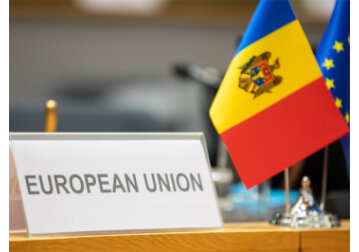
Government is developing Moldova's Economic Growth Plan to implement reforms and investments to support the country's entry into the EU internal market and promote inclusive economic growth.
This, among other things, is stated in the general negotiating position of Moldova, which was presented during the first Moldova-European Union Intergovernmental Conference in Luxembourg on June 25, which marked the beginning of negotiations on Moldova’s accession to the EU. The document notes that the European Union is Moldova's largest trading partner, and the country's authorities are aware that the creation of a functioning market economy is a necessary prerequisite for benefiting and promoting the EU internal market. It is noted that, by becoming a member of the EU, Moldova will contribute to the expansion of the European space of peace, stability and prosperity, the growth of the Community market, provide new trade and investment opportunities for European businesses, diversify EU supply chains and stimulate innovation, technological cooperation and economic growth. “We strive to create and maintain a stable financial and macroeconomic environment, as well as stimulate a dynamic economy, in accordance with European standards. To this end, Moldova will continue to harmonize its legislation with EU legislation,” the document says. It is emphasized that Moldova expresses deep gratitude for the financial assistance provided by the European Union and EU states over the years, and is committed to the effective use of allocated resources to promote economic development, social cohesion, sustainable growth and accelerated convergence with EU policies. “We are committed to deepening economic integration with the EU and strengthening our competitiveness in the European market. We also look forward to the possibility of accessing financial instruments to prepare for accession to the EU to support our transformation processes,” the document notes. It is emphasized that Moldova is already gradually integrating into European economic processes, taking decisive measures to prepare national entrepreneurs for the competitive EU economy. Important steps for Moldova's gradual integration into the EU single market are being taken by joining the EU Single Market Programme and the Digital Europe Programme, as well as applying for membership in the Single Euro Payments Area (SEPA). “One of our priorities is to join the EU “Roam-like-at-home” initiative and ratify the Agreement on Conformity Assessment and Acceptance of Industrial Products (ACAA) to further ensure Moldova’s integration into the EU single market. Moldova also continues its integration into the EU energy market through the accession of the central energy supplier Energocom to the common EU platform for the procurement of natural gas and through the association of the state-owned enterprise Moldelectrica as an observer member of ENTSO-E (European Network of Transmission System Operators for Electricity). As noted, Moldovan institutions are making significant efforts to harmonize national legislation with European standards, including by accelerating the implementation of obligations arising from the Association Agreement and the Deep and Comprehensive Free Trade Agreement between the Republic of Moldova and the EU and the corresponding Priority Action Plan. In this regard, key actions were taken, including the official submission of Moldova's application to join the Single Euro Payments Area, as well as updating the annexes to the Agreement on Deep and Comprehensive Free Trade Area between the Republic of Moldova and the EU with the latest European provisions in the field of telecommunications, postal and courier services. “We are committed to continuing to build strong institutions and strengthen their capacity to ensure the continuity and dynamic pace of the accession process,” the document emphasizes. // 28.06.2024 — InfoMarket







